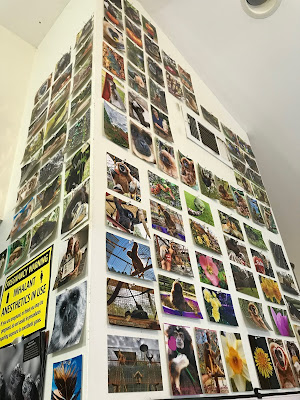This winter I was excited to get an invitation to attend a meeting on chimpanzee welfare at the Jane Goodall Institute (JGI) offices in the Washington, DC area. I had never before been to their offices and it was an honor to be included in the small group of international experts gathering there.
 |
| The real Jane was traveling, so this was her replacement. |
This conference served to bring chimpanzee welfare experts together to help deepen and
center the work of JGI, as well as to clarify the extent of this work on a global scale. Topics explored included JGI’s chimpanzee welfare strategy, the institutional role and the landscape of animal rights, animal protection and welfare, and unifying efforts, outreach and partnerships.
I was there representing the North American Primate Sanctuary Alliance (NAPSA). NAPSA ties were also represented by two members of our Council of Professionals and a founding member of our Steering Committee:
 |
| Steve Ross (Lincoln Park Zoo), Patti Ragan (Center for Great Apes), myself and Gregg Tully (PASA) |
Also in attendance were directors, founders and representatives from Tchimpounga, the Association of Zoos and Aquariums, the Arcus Foundation, Stichting Animal Advocacy and Protection, the World Association of Zoos and Aquariums, Center for Great Apes, Detroit Zoo, Lincoln Park Zoo, Pan African Sanctuary Alliance and Liberia Chimpanzee Rescue & Protection. Attendees came from just about every corner of the globe - from Africa to the Netherlands to Argentina.
 |
| Jenny Desmond, a founder of Liberia Chimpanzee Rescue & Protection |
 |
| Patti Ragan (Center for Great Apes), Gregg Tully (Pan African Sanctuary Alliance), Jenny Desmond (Liberia Chimpanzee Rescue & Protection) and myself |
Last year I was on the Founding Committee for the first ever World Chimpanzee Day. This meeting at JGI also attracted the other three founding members. It was so neat to meet in person, when normally we're spread out all over the world.
 |
Steve Ross (Lincoln Park Zoo), myself,
Jenny Desmond (Liberia Chimpanzee Rescue & Protection), Shawn Sweeney (JGI) |
I always feel a mixture of inspiration and energy mixed with confidence when I'm in a group like this. It's a great feeling to be surrounded by like-minded people, and it's humbling to see what they all have accomplished and continue to do. I was lucky to be there with them and I think our brainstorming sessions and collective advice will help guide the future work of the Jane Goodall Institute.




















































